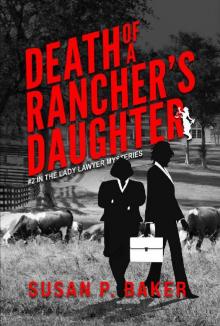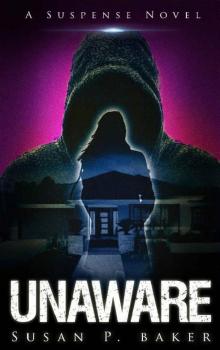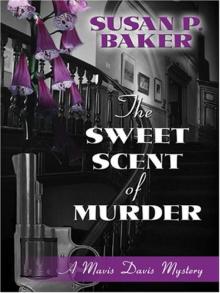- Home
- Susan P. Baker
The Sweet Scent of Murder Page 8
The Sweet Scent of Murder Read online
Page 8
“When?”
“Twelve—thirteen years ago.”
“That’s the last time you talked to him?”
“Yes.”
“And where was that?”
“In the courtroom.”
“In the courtroom?”
“After the trial.”
“After you fought a custody battle?”
“No. Right after he was sentenced to prison.”
“Your ex-husband went to prison?”
“Yes.”
“For what?”
“Having sex with the children.”
Chapter Nine
It was at this point that the plate of sandwich and cookies made like a set of skis, skidded down my lap, and landed at her feet. The cookies bounced, one landing on top of her shoe. In my attempt to catch the plate, my cup fell over, tea cascading off the saucer onto the carpet. I righted it before too much soaked in, but it was a shame about that chip.
Replacing the cup and saucer on the tray, I mopped at the tea with my napkin, grabbed the cookies, put them back with the sandwich, put it on the tray, and wiped off the top of her shoe. Brushing at my clothes, I sat back down and reached into my bag for a cigarette before remembering, again, that I had quit. I realized, then, how often I used my cigarettes to disguise or assist with something else that was going on. In this case, I needed a few moments to digest what she’d said. What an addict I am.
All the while, Mrs. Lawson sat watching. Then she said something about not being concerned about my little accident. I tried to stop my brain from calculating too quickly what could be in store for those two missing teenagers if what she said was true. Her ex a child molester? Would the kids be okay? Why would they go with him? Of course, the possibility still existed that they weren’t even with the man. Then again, what if they were and prison had messed with his mind and he was a worse pervert than ever and . . . never mind, I must stay in the present moment.
After I settled back on my perch and apologized profusely a number of times, Mrs. Lawson said, “I’m sorry I got you so upset. For some reason, I got the impression that you knew all of this.”
I wagged my head. No question she was as sharp as I suspected. “Lady, if I had known any of this, I wouldn’t have been here sipping tea with you. I would have been moving mountains in search of your children.”
She heaved a deep sigh and smiled. “I wanted to tell you yesterday. If it hadn’t been for Harrison . . .”
I nodded. Sure she did. And it had only been the inconvenience of her present husband’s death that had stopped her.
“I mean, I contemplated telling you when you first appeared at the door but didn’t get a chance. You see, when Jeanine turned up missing, my first thought was that she was just angry and would return home. I began to worry when she didn’t.”
“I can see why.” I nodded, noting her skill.
“Let me clarify.”
“Sure.” I put my hand on my knee to stop my foot from tapping. The whole scene made me a little nervous, but I was all ears.
Her face relaxed a tad, and her lips turned up at the corners as she looked at me. “It sounded crazy to Harrison, Miss Davis, but when the authorities began releasing so many prisoners so quickly in recent years—because of the overcrowding in the prisons, you know—I got worried that Arthur would be among them and would come and get us. He was very bitter about the jury’s verdict. When he turned and looked at me in the courtroom that day—and said he would get me—I knew by the look in his eye that he meant it.”
“How many years did he get for . . . that?”
“Fifty, but you know they get all kinds of credit for good behavior from what I understand. Remember a year ago they released that woman who hired that man to kill her parents? I read about that in the newspaper. She received two life sentences, but they let her out after ten years.”
“It’s called good time.” I shook my head. “To think that he might be out after twelve or thirteen. Well, it shouldn’t be any big surprise to me, but a convicted child molester . . .”
“You see, Miss Davis, Arthur used to work at the insurance company with Harrison. I did, too. That’s where I met Harrison. He was my boss. After Harrison and I got married, I quit work so I could stay home with the children.”
And to think I thought she came from money.
“When I first suspected what Arthur was doing with the children, I didn’t know where to turn, so I went to Harrison who turned out to be a great help. He stood by me through the child welfare and police investigations. They found out that Arthur did some terrible things.” She had that faraway look again.
“Anyway, after Arthur was convicted, it seemed only natural that Harrison and I should get married, so I got a divorce from Arthur after he went to prison. After our marriage, we decided that Harrison should adopt the children. We had Arthur’s parental rights cut off, and Harrison adopted them.”
“Then recently you got word that Arthur had gotten out of prison?” I asked.
“Yes, but not right away. It wasn’t until Jeanine was gone overnight and then Tommy . . . I didn’t tell the police what I suspected about Jeanine because I couldn’t be sure, but after the school principal called, Harrison called our attorney who made inquiries.” She picked up her teacup and sipped, patted her lips with her napkin, and continued, “We had just gotten word that Arthur had made his parole when everyone showed up for the party. Harrison said we should go on, business as usual. He didn’t think Arthur would hurt the children. In fact, I was having trouble convincing him that Arthur took them. And then you came.”
“And then he died—”
“Yes. I just can’t figure out how Arthur managed all of it. I will, though, once I get my children back.”
“So you think Arthur, the children’s father, killed Mr. Lawson after he took the children? Do you have any proof, Mrs. Lawson?”
“Miss Davis,” she said with that trance-like expression again. “I don’t need proof. I know it in here.” She placed her hand on her breast.
Oh, brother. I thought she’d not only had drama lessons but melodrama lessons. I nodded again. “What do you think he’ll do to them?”
She sighed. “I don’t know.” Her blue eyes searched mine. She grimaced. “If he was sick enough to do what he did back then, there’s no telling how sick he is now. I can’t imagine what he’s been through, there in prison.”
“I can. I’m surprised the other inmates didn’t kill him,” I said, remembering all the stories I’d heard.
She sipped her tea, her eyes getting that faraway look again. The room grew still. A bird twittered outside. The air-conditioning kicked on. Cool air hit the back of my neck.
After a few minutes, our eyes met. She said, “Do you still want to find my children, Mavis?” She blinked rapidly. “May I call you Mavis? Because, if so, I’ll pay you myself.”
“Certainly.” I stared down at my lap, determined to be in control of the situation and see what else I could find out. At the same time, I didn’t want to tip her off that I didn’t buy everything she was trying to sell. I got out a notepad and pen. “Tell me everything you can about your ex-husband. All of his habits. What he liked to do with his time off. Who his friends were. Where you think he might be. Everything.”
For the next hour, Hilary Lawson and I had an in-depth discussion about Arthur Woodridge. By the time we were through, I felt as if I knew him as well as she thought she did. She even remembered that his folks used to own a cabin out in the woods in one of the counties outside of Houston, though she had never deigned to set foot in it. She thought his parents probably left it to him in their wills. She couldn’t remember exactly where it was located, but if I could find it, and he did own it, it would be the most logical place to look for him and the kids. Kelby McAfee might know more about it since he and Arthur used to be such good friends before Arthur went to prison.
I was about to get into my car when Frankie beckoned to me from the side of the house.
No one appeared to be looking out of the front windows so I went over to her. “What is it?” She pulled rather roughly on my arm until we were out of view of the front windows. “Miz Davis, Arthur didn’t have anything to do with Mr. Lawson’s death.” Her breath came in quick; short gasps as if she’d been running.
“How do you know that?”
“I know him. He wasn’t the sort. All he wanted was to see the children.” She seemed earnest. Her eyes didn’t waver. But everyone seemed to have a motive for everything these days. I wondered what hers was.
“How did you know about the children?”
Frankie studied the concrete under our feet.
“Frankie ...”
“So I talked to him, so I told them they should go see him,” she said. “You won’t tell on me, will you?”
I tried to hide my surprise. “Not if you tell me everything.”
“There isn’t time—she’ll catch me.”
“Who—Hilary? What could she do to you?”
“She’d let me go after all these years, and where am I to get another job these days at my age?”
“You’re wasting time, Frankie. Just tell me what you know and I won’t keep you.”
“I know he didn’t do what she said he did.”
“How do you know that?”
“He told me so.”
“Great.”
“No,” she said, grabbing my arm again. “You’d have to know him. He wrote to me.”
“From prison?”
She nodded.
“What’s he like?”
“A very nice man who ended up with the wrong woman.” She frowned.
“Why didn’t you come forward at the trial?”
“I couldn’t, Miz Davis. I had no proof. I just knew he wouldn’t do what she said he did to those babies, but who would believe me? I’m just a poor, old woman from the wrong side of town who’s lucky to end up working in River Oaks. Besides, she had Harrison Lawson behind her and he was powerful even then.”
“Did you know Arthur was getting out of prison?”
“He wrote and told me and asked if I’d talk to Jeanine and Tommy.”
“So Tommy did know where Jeanine had gone.”
“He wouldn’t go at first, but she made him promise to keep it a secret. She was supposed to come back home.”
“Why didn’t she?”
“I don’t know, Miz Davis. There’s no predicting that girl. The way I figure it, she contacted Tommy and got him to come. I’m sure they’re all right, though.”
“You don’t know that, Frankie.”
“I do—in my heart.”
“Not if Arthur killed Harrison Lawson.”
“He didn’t, though, not Mr. Woodridge. He never came near the house.”
“But you think it wasn’t a heart attack, too?”
“Mr. Lawson had a heart attack some time ago, sure, but since then he’d been taking good care of himself, eating right, exercising. No, someone did something to him, and if it wasn’t Miz Lawson then it was someone who was here the night before, for dinner.”
“Dinner? Why didn’t Mrs. Lawson mention that?”
“I don’t know. I guess she wants it to be Mr. Woodridge. All I know is, it wasn’t.”
“Who was here that night?”
“I can tell you who was invited. She gave me the night off—said since the kids weren’t here if I’d cook dinner then I could have a night out. The Hadleys—”
“Hadley. He’s the short, ugly man with the holes in his face?”
“That’s right, Mr. Clayton Hadley. He’s in some property doings with Mr. Lawson. I mean, he was. Then there was the Smythes—”
“The stockbroker.”
“Yes. And the McAfees and Mr. Rush with some big blonde girl who was all over him so much it was embarrassing. He arrived early with her, just as I was leaving.”
I laughed. “Is that it?”
“Yes. Ten, including Mr. and Miz Lawson.”
“Well, thank you, Frankie. You’ve been very helpful.” I took her hand and shook it.
“You’re not going to tell on me, are you?” she asked, a note of urgency in her voice.
“No,” I said. “Do you know where Arthur took the kids?”
She shook her head. “If they’re not in that cabin, then I don’t know. They haven’t called. I guess they’re afraid Miz Lawson will answer the phone.”
I shouldn’t have been surprised that she’d overheard our conversation. “Thanks. You’ve been a big help.” I squeezed her hand. “Oh, one more thing. Mr. Lawson was drinking schnapps at the time of his death. Was that his usual drink?”
“Lord, yes. It’s awful stuff and no one else will touch it, but Miz Lawson has to be sure there is always some on hand—I mean she did.” Frankie shrugged. “Well, anyway . . .”
“Thanks again. You’re a doll.” The last time I saw her, she smiled for the first time since I met her.
Chapter Ten
I would have been chomping at the bit all weekend if Ben and I hadn’t planned to spend it together. Not only did he sleep over on Saturday night, which was a rarity, but on Sunday we drove the fifty miles to Galveston Island and went to the beach, one of my favorite activities. I could only hope the kids were really okay, just as they’d told the girls.
Come Monday, since I was still hired to find the kids, I finally made it to the National Insurance Trust offices. They were all thick glass, deep pile carpeting, and huge green plants on the fourteenth floor of a building not far from the Allen Parkway. Outside, the building looked like hundreds of huge mirrors stuck together. I always wondered why they didn’t reflect the sun so much that it blinded people or caused airplanes to crash, but apparently they didn’t.
The front office had a receptionist that looked like a gazillion bucks. I asked for Kelby McAfee and, after a half-hour wait, she directed me through double glass doors, past rows of Danish modern desks with women listening to earphones and typing, and phones ringing incessantly.
Down a long aisle, around a corner, then another, and I came upon a kind of cul-de-sac with a desk, chairs, and other office paraphernalia positioned in the center. A middle-aged woman stood beside the desk as though waiting for me. She wore a dark brown long-sleeved jacket over a brown-and-white belted shirtwaist dress. Closed doors bearing nameplates encircled the area. The one directly behind the woman said HARRISON LAWSON in big, bold letters.
I handed her my business card. “I’m Mavis Davis. Here to see Mr. McAfee.”
“Annette Jensen,” she said. “Have a seat and I’ll tell him you’re here.” I sat in a chair opposite her. She picked up a phone, pushed a button, and announced me, all very prim and proper. She wore her brown-and-gray hair cut short and sprayed back away from her face. She had long red fingernails and rings on almost every finger. “It’s going to be a few minutes. He’s finishing up a meeting. Would you like a cup of coffee?”
“No, thank you. I’m a tea sipper.” Again I wished for a cigarette and wondered how long it would take to lose that desire.
“Suit yourself.” She pulled open a drawer. “I have some tea bags in here somewhere.”
“Oh, that’s okay. Don’t bother. Have you worked here long?”
“Twenty-five years.” She smiled a small smile of pride. “I’m the office manager. Sort of like an assistant to Mr. Lawson.” Her eyes met mine—suddenly I realized that she was barely holding herself together. “I hope I’ll continue in that capacity.”
I wondered if she meant by that last remark that she and McAfee didn’t get along, but her face was void of all expression. “I guess you knew Mr. Lawson pretty well, didn’t you?”
“I worked here when he got his first big promotion. Back then we were good friends.”
“You probably know his wife then, too.”
She frowned almost imperceptibly. “I know her. I used to be her supervisor,” she said with a contemptuous tone in her voice.
My ears pricked up. “It was prett
y sad at their house Friday and Saturday.”
“Humph.” Her eyes cut from mine down to the papers on her desk. I wondered what was going on behind those lashes besides the fact that clearly she didn’t care for Hilary.
“Will you be going to the funeral?”
“Yes. They’ll let me off for that, but I have a feeling a lot of things are going to change around here.” She cocked her head toward a door to the right of her desk. I couldn’t read the nameplate from where I sat.
I leaned toward her, trying to create an air of confidentiality. “I heard that Mr. McAfee would probably be selected by the board to be in charge now.”
Her eyes met mine again. I wondered what she knew. Probably everything of consequence that had ever happened at that company. We stared at each other for a few seconds, then she picked up a stack of papers and began straightening them. Finally, she said, “We’ll see.”
“I take it that you don’t like him.” I straightened the hem of my skirt where it lay on my calf, trying to act casual. When I looked up, she stared at me still, one eyebrow arched. “I’m sorry. I didn’t mean to offend you.”
She whispered, “It doesn’t matter whether I like him or not. I just hope to keep my job. It would be hard to find another one at my age.” She appeared to be somewhere in her fifties.

 Death of a Rancher's Daughter
Death of a Rancher's Daughter UNAWARE: A Suspense Novel
UNAWARE: A Suspense Novel The Sweet Scent of Murder
The Sweet Scent of Murder Suggestion of Death
Suggestion of Death Death of a Prince
Death of a Prince My First Murder
My First Murder